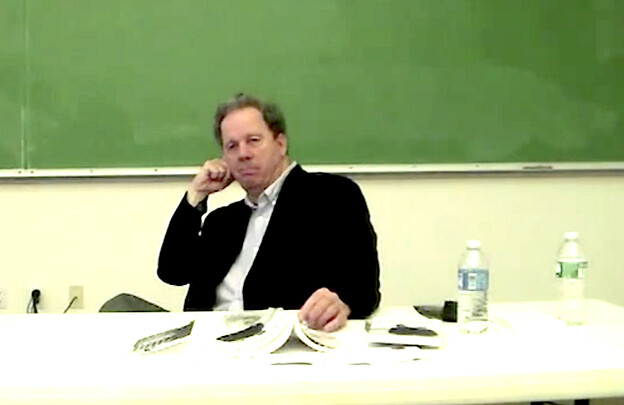Remembering Ben Hollander

Note: In November 2016, Jacket2 published remembrances of Benjamin Hollander (1952-2016) by Joshua Schuster and Steve Dickison. Now we are adding three new pieces about Ben: a memory of his teaching, by Edgar David; a eulogy given by Murat Nemet-Nejat; and an excerpt from a review-essay also by Murat. —Al Filreis
A Recollection of Ben Hollander's Teaching
Ben was a great poetry teacher, one of the first things he would have students do is answer a few questions. If I remember correctly, the questions were “Why do you write poetry? What inspires you? Who do you write poetry for? and Why are you taking this class?” This always made students think a little more about poetry, especially “Who do you write poetry for?” Ben used a Socratic approach to the class; he would hand out readings and we would discuss them. He would sit back and let the students discuss and would ask questions once he saw that a student was onto something but couldn’t word it. When the discussion was over, we would workshop poems. That’s where he would be really strict. Although I thought it was a great approach, most students felt discouraged and, after the first few workshops, a few students would stop going.
Yet Ben was not trying to discourage students. It was the opposite; he wanted them to go deeper into the poetry they were writing. At least that’s what I got from the critiques he made on my poems. And they helped a lot. I felt my poems went from what I thought was good to poems but weren’t, to poems that I knew were good. I felt as if my poems gained substance after taking Ben’s class.
I also took Ben's class on the Holocaust, which had a similar approach, although he would lecture once in a while. Ben was not such a great lecturer; he would go on tangents or become redundant, but the information he offered was so rich that it took a while for us to digest everything. Ben also liked telling jokes, but often only a few people in the class would laugh. Sometimes because the jokes were absurd; sometimes because it seemed bad to laugh. I thought the most of the jokes were funny, because I knew Ben was joking.
—Edgar David
***
Eulogy for Ben Hollander
To Ben
Trying to come up with words to say in this occasion, I realized I simply loved the man. I loved his seamless generosity, that often came unasked and had no ulterior, self serving motivation behind it.
In a peculiar [light filled] innocence that was so much Ben, his heart was pure.
Once I told him that to me he represented the best, the essence of the Jew in history. He asked me why. I said because he understood the suffering of others.
Many of his books are about outrage (in a peculiar non ego-centric way, circuitous, heteronymic, funny, that was his signature style) about an injustice or unfairness done to others, whether it be the Palestinians or the innocent stiff on the street being bullied by the cop or Charles Olson.
Many of you know he appreciated very much that the French compared his poetry to film noir. Writing on him, [o no me and Levinas and the Police] I called his work film lumière. He asked me why. I said because your darkness is full of light.
Ben explains in Vigilance how he came to the word/sound o no me. One day, in total darkness, blind, he beganto scribble some words on a piece of paper on the table. When he turned on the light and looked at what he wrote, it was o no me. "Oh, not me, the responsibility's not mine! Let others do it." "Oooh not mee! Others may get cancer, not me! Other countries may be attacked by terrorists, not the United States." Ben got cancer.
Our last conversation occurred on the phone, just before the last experimental drug was going to be tried on him. “They will give it to me for two weeks. By then they will know if it works or not,” he said. “What if it doesn't?” “Then, I'm dead.”
May your soul rest in peace, dear friend!
—Murat Nemet-Nejat
***
Selections from Eleven Septembers Later: Readings of Benjamin Hollander's Vigilance[1]
I. Responsibility
The Weapon of Mass Destruction has escaped its silo and mutated into an idea. A virtual threat, a pure possibility. The ideal frictionless space of fascism.
Benjamin’s Vigilance is the poem of this universe. On the one hand, it is permeated with the ambient sound of reinforced threat, full of loving cops’ eyes, looking out for us, among us: the sound, repetitive, hypnotic, almost incestuous in its embrace. Simultaneously, Vigilance is the attempt to wake up from this hypnotic flow, to stop it, to split into a new consciousness.
Traditionally the idea of form assumes that parts work in tandem for an ideal whole. The reverse is true in Vigilance. The ear (sound) is in conflict with the eye. The reader of Vigilance is repeatedly stopped in his/her tracks and forced to re-read what he/she has just read. The poem can only be experienced as discontinuous flashes of recognition, of light, which drain the sound flow of all its forward energy, turning it into a shell.
 The baffled eye of the reader confronts an unstable text, where certain sounds changing their word formations shift their accents. This confrontation can be called Film Lumiere. Film Lumiere is cinema slowing towards photography, blurring image and sound into a glow.
The baffled eye of the reader confronts an unstable text, where certain sounds changing their word formations shift their accents. This confrontation can be called Film Lumiere. Film Lumiere is cinema slowing towards photography, blurring image and sound into a glow.
The genius of fascism is that it is based on love. The leviathan of state turns into a performer of gentle punishment, loving duress. In most fascisms, the public at large – for a short and brute period at least- is in love with its leader. Freedom is falling politically out of love. In capitalist fascism the eye — petit-pointed with pain, and yearning — is the sine qua non of love. By his images, the leader ogles the public into his erotic, protective, parental embrace, the public responding too with his eyes. T.V. is a pornographic contraption of communal fuck, a bait and switch peep show, while looking being looked at, seeing while being seen into. A colossal move on our clits. Freedom starts with an aversion of the eyes -a moral modesty! — a decision not to see, the eye blurring in mist, choosing a mournful blindness, which puts a stop to the erotic synergy. Freedom is a vigil towards stasis –an action against flow — a “seeing” into oneself, transforming the gaze into an ascetic guerilla weapon.
Freedom is photographic contemplation,1 contra incest.
send home my long strayed eyes to me.
which (oh) too long have dwelt on thee (John Donne, The Message)
But now I have drunk thy sweet salt tears,
And though thou pour more I’ll depart;
My picture vanished, vanish fears,
That I can be undamaged by that art (JD, Witchcraft by a Picture)
In the stop and go rhythms of Vigilance, the poem progresses to a stasis, a vigilante act into the meditation of a vigil. The eye grows weak with tears, asking the question: what is the relation between morality and force, Levinas and the police?[2]
IV. Levinas and the Police
Onome, the first part of Vigilance, has a story to tell. It is the story of society, captured, demented, entering a panopticon prison.
Levinas and the Police is about the “state of being,” in prison:
Listen, Lt.: we live in a house called The Problem of Being
Me-half-seen-on-you-half-seen-on-me (Levinas and the Police)
In places, Levinas and the Police can not be read aloud — it has no sound — because the disruptive eye penetrates the very sentence. Arranged in thin vertical lines, sentences moving in one direction, requiring a certain cadence, are split in the “wrong” place, thrown out of the kilter of their forward motion. The reader’s eye keeps falling out of focus. This is the experience of reading Levinas and the Police: the surface of an action is penetrated by a blurring of seeing/sound:
Listen, Lt.
I do
like you
po
lice us
Sir
ens
Mist
er
Sir (respect) turns into fear (sirens). Mister (obedience) slows down to “mist.” This cadential transformation of sound through the eye is the moral struggle of Vigilance. The vigilance of state (its pervasive, protective watching) blurs into a counter-vigilance of vigil, a mournful awakening.
Though crackling with the rhythms of street or courtroom action, the progression of the poem is towards stasis, towards the “mist” of a frozen still. Hollander’s work is often associated with film noir. In its meditative, disruptive nature, Vigilance is more like a film moving towards the state of photography. Once the authority of the photographer is denied, a photograph is a “random,” “peripheral” dialogue between the viewer and the subject before the lens. Vigilance also is a confrontation between gazes, the eye of the reader trying to see clearly through stillness.
The heart of this stillness is light, which leaves traces of something invisible on the plane surface. In that sense, Vigilance, particularly Levinas and the Police, is Film Lumiere.
Jean-Luc Godard, in his Histoire du Cinema, points to that connection between photography and a new cinema. He refers to the gaze in the paintings of Velasquez and Manet –two of the four photographic painters- which can only be responded to by the viewer’s gaze. This confrontation stills and transforms a cinema of continuity and action –what Gilles Deleuze calls “movement image”- into a critical, reflective cinema, “time image.”
The flow of time is what a photograph captures in its light. Film Lumiere is action moving towards stillness. Godard’s In Praise of Love is Film Lumiere.
[It] eliminates space, telling a story twice, before and after it happened, in a simultaneous now... In Vigilance the eye and ear of the reader struggle to occupy a mutually exclusive space...
V. Precedents of Prophecy
My favorite fragment in Vigilance, which gives me the greatest pleasure, is based on my misreading of a word, “I’m amiss”:
"and I’m amiss to have looked on the wetting of the blinds with mist they are covered, if only they knew” (Onome)
I see “amiss” as the passive form of “missing”(“aghast”). The line starts with an assertion of the ego (“I’m”) and turns into longing for something in the most passive, most intense way, folding back on itself. A vigil, mournful. The eyes covered in mist, “if only they knew.” Then I “see” I missed the element of blame the word socially partakes, O No Me!
—Murat Nemet-Nejat
[1] This review essay was included in Benjamin Hollander's Vigilance (Beyond Baroque, 2005).
[2] "Levinas and the Police" is one of the poems in Benjamin Hollander's Vigilance.